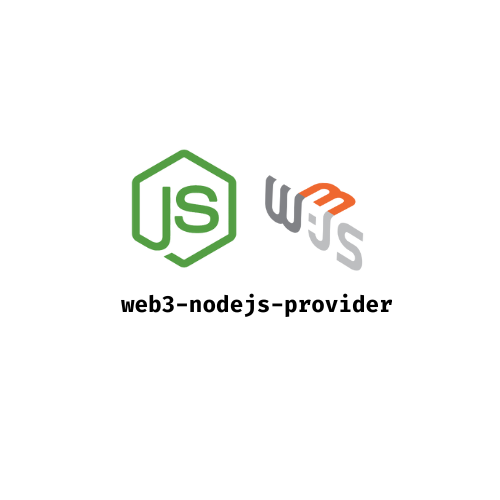HD Wallet-enabled Web3 provider. Use it to sign transactions for addresses derived from a 12 or 24 word mnemonic.
Note: This is fork of https://www.npmjs.com/package/@truffle/hdwallet-provider with changes:
- Explicitly provider
privatekeys,mnemomic(or both) - Removed
sharedNonceoption provider.stopis handled by environment, needless to callprovider.stop()
$ npm install web3-nodejs-provider
$ yarn add web3-nodejs-provider
Node >= 12
Web3 ^1.2.0
You can use this provider wherever a Web3 provider is needed. Suitable for use in Nodejs, Deno runtimes where
window.ethereum is not available.
You can instantiate Web3NodejsProvider with options passed in an object with
named keys. You can specify the following options in your object:
Parameters:
| Parameter | Type | Default | Required | Description |
|---|---|---|---|---|
mnemonic |
object|string |
null |
[ ] | Object containing phrase and password (optional) properties. phrase is a 12 word mnemonic string which addresses are created from. Alternately the value for mnemonic can be a string with your mnemonic phrase. |
privateKeys |
string[] |
null |
[ ] | Array containing 1 or more private keys. |
providerOrUrl |
string|object |
null |
[x] | URI or Ethereum client to send all other non-transaction-related Web3 requests |
addressIndex |
number |
0 |
[ ] | If specified, will tell the provider to manage the address at the index specified |
numberOfAddresses |
number |
1 |
[ ] | If specified, will create numberOfAddresses addresses when instantiated |
shareNonce |
boolean |
true |
[ ] | If false, a new WalletProvider will track its own nonce-state |
derivationPath |
string |
"m/44'/60'/0'/0/" |
[ ] | If specified, will tell the wallet engine what derivation path should use to derive addresses. |
pollingInterval |
number |
4000 |
[ ] | If specified, will tell the wallet engine to use a custom interval when polling to track blocks. Specified in milliseconds. |
chainId |
number|string |
undefined |
[ ] | Specify to enable signed transactions that are EIP-155 compliant for major chains. |
Some examples can be found below:
const Web3NodejsProvider = require("web3-nodejs-provider");
const Web3 = require("web3");
const mnemonicPhrase = "mountains supernatural bird..."; // 12 word mnemonic
let provider = new Web3NodejsProvider({
mnemonic: {
phrase: mnemonicPhrase
},
providerOrUrl: "http://localhost:8545"
});
// Or, alternatively pass in a zero-based address index.
provider = new Web3NodejsProvider({
mnemonic: mnemonicPhrase,
providerOrUrl: "http://localhost:8545",
addressIndex: 5
});
// Or, use your own hierarchical derivation path
provider = new Web3NodejsProvider({
mnemonic: mnemonicPhrase,
providerOrUrl: "http://localhost:8545",
numberOfAddresses: 1,
shareNonce: true,
derivationPath: "m/44'/137'/0'/0/"
});
// To make HDWallet less "chatty" over JSON-RPC,
// configure a higher value for the polling interval.
provider = new Web3NodejsProvider({
mnemonic: {
phrase: mnemonicPhrase
},
providerOrUrl: "http://localhost:8545",
pollingInterval: 8000
});
// HDWalletProvider is compatible with Web3. Use it at Web3 constructor, just like any other Web3 Provider
const web3 = new Web3(provider);
// Or, if web3 is alreay initialized, you can call the 'setProvider' on web3, web3.eth, web3.shh and/or web3.bzz
web3.setProvider(provider)
// ...
// Write your code here.
// ...
// At termination, `provider.engine.stop()' should be called to finish the process elegantly.
provider.engine.stop();Note: If both mnemonic and private keys are provided, the mnemonic is used.
The legacy interface is deprecated and it is recommended to pass options in an object as detailed above. The following method of passing options is here primarily to document the interface thoroughly and avoid confusion.
You can specify the following options in the order below.
Pass undefined if you want to omit a parameter.
Parameters:
| Parameter | Type | Default | Required | Description |
|---|---|---|---|---|
mnemonic/privateKeys |
string/string[] |
null |
[x] | 12 word mnemonic which addresses are created from or array of private keys. |
providerOrUrl |
string|object |
null |
[x] | URI or Ethereum client to send all other non-transaction-related Web3 requests |
addressIndex |
number |
0 |
[ ] | If specified, will tell the provider to manage the address at the index specified |
numberOfAddresses |
number |
1 |
[ ] | If specified, will create numberOfAddresses addresses when instantiated |
shareNonce |
boolean |
true |
[ ] | If false, a new WalletProvider will track its own nonce-state |
derivationPath |
string |
"m/44'/60'/0'/0/" |
[ ] | If specified, will tell the wallet engine what derivation path should use to derive addresses. |
chainId |
number|string |
undefined |
[ ] | Specify to enable signed transactions that are EIP-155 compliant for major chains. |
Instead of a mnemonic, you can alternatively provide a private key or array of
private keys as the first parameter. When providing an array, addressIndex
and numberOfAddresses are fully supported.
const Web3NodejsProvider = require("web3-nodejs-provider");
//load single private key as string
let provider = new Web3NodejsProvider("3f841bf589fdf83a521e55d51afddc34fa65351161eead24f064855fc29c9580", "http://localhost:8545");
// Or, pass an array of private keys, and optionally use a certain subset of addresses
const privateKeys = [
"3f841bf589fdf83a521e55d51afddc34fa65351161eead24f064855fc29c9580",
"9549f39decea7b7504e15572b2c6a72766df0281cea22bd1a3bc87166b1ca290",
];
provider = new Web3NodejsProvider(privateKeys, "http://localhost:8545", 0, 2); //start at address_index 0 and load both addressesNOTE: This is just an example. NEVER hard code production/mainnet private keys in your code or commit them to git. They should always be loaded from environment variables or a secure secret management system.
Compose own providers (Made to work with MetaMask Browser Wallet only): https://github.com/MetaMask/web3-provider-engine
Please consider supporting this project by making donations via:
- Bitcoin:
3AKZndQ3fgj48emakUXe81dyW7zTJQm7wv - USDT(Ethereum):
0xB61ED210326FEb11A1f7048c77c404553fCed702
